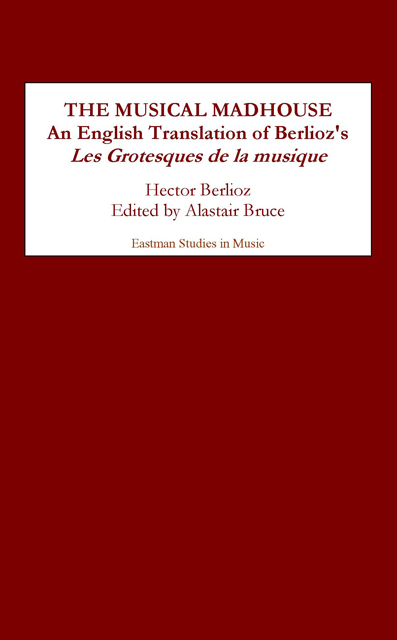Dilettanti of the fashion world—The poet and the cook
Published online by Cambridge University Press: 21 March 2023
Summary
One often hears people in the fashionable world complaining about the length of operas—how tiring these huge works are to their audiences, how late at night performances end, and so on. As a matter of fact, these malcontents have no right to complain; for them there are no five-act operas, only three-and-a-half-act ones. Society people aren’t in the habit of arriving at the Opéra before the middle of the second act, and sometimes later. No matter whether the performance begins at seven or half-past seven or eight o’clock, they won’t put in an appearance in their boxes before nine.
Despite this, they’re definitely anxious to get seats for first nights; but this isn’t by any means a sign of their eagerness to get to know the work being performed, which is of very little interest to them. It’s merely a matter of being seen in the theatre that evening and being able to say “I was there”, with some superficial observation on the nature of the new work and some kind of assessment of its merits, that’s all. A composer nowadays who writes a splendid first act can be certain of seeing it played to a house threequarters empty, and of being applauded only by the gentlemen of the claque, who are at their posts long before the curtain goes up. These days a new opera is given scarcely once every two years; so fashionable opera-goers would only have to depart from their usual behaviour once in two years to hear a production of such significance in full at its first performance. But the effort is too great, and the most miraculous inspiration of a great composer wouldn’t get these people, who pass for polite society, to bring even their horses’ dinners forward by as much as a quarter of an hour.
Of course the composer can console himself for this discourtesy and indifference with an even greater indifference, saying “Why should I care that the people in the orchestra stalls and boxes aren’t in their seats? The support of so-called music-lovers like that isn’t worth having.”
It’s the same almost everywhere. Think how often ordinary members of the audience at the Théâtre-Italien can be seen getting upset during performances of Don Giovanni at the precipitate emptying of the principal boxes as soon as the Commendatore’s statue appears.
- Type
- Chapter
- Information
- The Musical MadhouseAn English Translation of Berlioz's <i>Les Grotesques de la musique</i>, pp. 151 - 152Publisher: Boydell & BrewerPrint publication year: 2003

